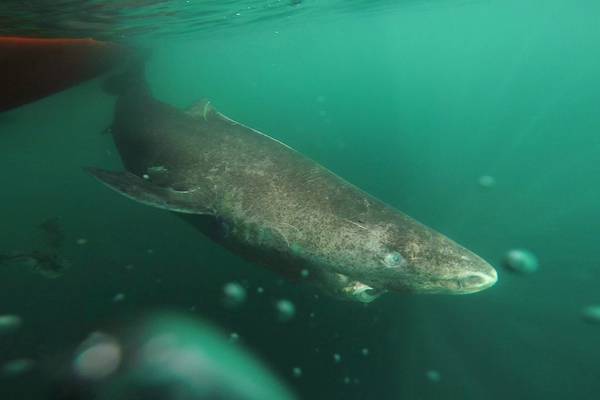Scoperti gli squali Highlander, hanno 400 anni, vivono nell'Artico e sono i vertebrati più longevi del mondo. / Discovered the Highlanders sharks, are 400 years old, live in the Arctic and are the longest-lived vertebrates in the world.
Scoperti gli squali Highlander, hanno 400 anni, vivono nell'Artico e sono i vertebrati più longevi del mondo. / Discovered the Highlanders sharks, are 400 years old, live in the Arctic and are the longest-lived vertebrates in the world.
Segnalato dal Dott. Giuseppe Cotellessa
/ Reported by Dr. Joseph Cotellessa
Alcuni di loro sono nati nel '600 mentre in Europa infuriava la Guerra dei 30 anni e in Francia regnava il Re Sole: sono gli squali della Groenlandia, che possono vivere fino a 400 anni aggiudicandosi il record mondiale di longevità dei vertebrati. Descritti sulla rivista Science, li ha studiati un gruppo di ricerca guidato da Julius Nielsen, che lavora fra università di Copenaghen, Istituto di risorse naturali della Groenlandia, acquario Nazionale della Danimarca e università norvegese dell’Artico.
Gli squali della Groenlandia, il cui nome scientifico è Somniosus microcephalus, sono ampiamente diffusi in tutte le acque del Nord Atlantico e si spingono più a Nord di qualsiasi altra specie di squalo. Gli adulti possono raggiungere fino a 5 metri di lunghezza e crescono con un ritmo lentissimo, di circa un centimetro all'anno, tanto da raggiungere la maturità sessuale a 150 anni. Si sa pochissimo della loro biologia, ma secondo i ricercatori il tasso di crescita molto lento è il segreto della loro longevità.
Per determinare l'età media di questi pesci è stata utilizzata la tecnica di datazione al radiocarbonio, analizzando il cristallino degli occhi di 28 femmine catturate durante una campagna condotta tra il 2010 e il 2013. Le più anziane del gruppo avevano 335 e 392 anni e raggiungevano una lunghezza pari a 4,93 metri e 5,02 metri. Le altre erano più giovani e avevano in media 272 anni.
Se per l'uomo festeggiare un secolo di vita è un traguardo raro, questi squali a 100 anni sono ancora giovanissimi e vivono il doppio degli altri vertebrati più longevi scoperti finora, cioè le balene artiche (Balaena mysticetus), che vivono in media 200 anni. Alcune tartarughe invece possono superare i 170 anni, mentre lo storione di lago (Acipenser fulvescens) può sopravvivere fino a 150 anni. Tuttavia esistono degli invertebrati che vivono ancora più a lungo e sono dei molluschi commestibili: il più anziano esemplare di vongola oceanica (Arctica islandica) mai scoperto aveva 507 anni.
La scoperta della straordinaria longevità degli squali della Groenlandia è stata una sorpresa per i ricercatori: benché siano documentati nei libri di scienza dalla fine dell'800, questi restano ancora molto misteriosi e di loro si sa pochissimo. Sapere che sono i vertebrati più longevi che vivono sul pianeta e che hanno attraversato diversi secoli di storia come gli Highlander è un motivo in più per tutelarli. Questi squali sono infatti compresi nella lista rossa delle specie a rischio della Norvegia perché vittime di cattura accidentale durante le battute di pesca.
ENGLISH
Sharks of Greenland, whose scientific name is Somniosus microcephalus, are widespread throughout the waters of the North Atlantic and push themselves further north than any other shark species. Adults can reach up to 5 meters in length and grow up with a very slow pace, about one centimeter per year, enough to reach sexual maturity at 150 years. Very little is known of their biology, but according to researchers at the rate of very slow growth is the secret of their longevity.
To determine the average age of these fish was used radiocarbon dating technique, analyzing the lens of the eye of 28 females captured during a campaign conducted between 2010 and 2013. The older group had 335 and 392 years they reached a length of 4.93 meters and 5.02 meters. The others were younger and had on average 272 years.
If for humans celebrate a century of life is a rare achievement, these sharks to 100 years are still very young and live twice as many other more long-lived vertebrates discovered so far, that bowhead whales (Balaena mysticetus), who live on average 200 years . Some turtles instead may exceed 170 years, while the lake sturgeon (Acipenser fulvescens) can survive up to 150 years. However, there are invertebrates that live even longer and are edible molluscs: the oldest specimen of ocean clam (Arctica islandica) had ever discovered 507 years.
The discovery of the extraordinary longevity of the sharks of Greenland was a surprise to the researchers: although they are documented in science books from the 800, these are still very mysterious and very little is known of them. To know which are the longest-lived vertebrates that live on the planet and that crossed several centuries of history as the Highlanders is one more reason to protect them. These sharks are in fact included in the red list of endangered species in Norway because of bycatch victims during fishing trips.
Da:
.




Commenti
Posta un commento